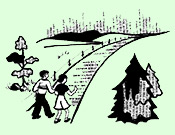
By Lois E. Wilson
I recently was prescribed a topical ointment to apply on painful areas four times a day. On the outside of its box, it advised “See Medication Guide and Patient Instructions Inside.” The folded instruction sheet opened up to be a page 2’ by 13” in small print. It had a long list of possible drug interactions and contraindications for the product’s use. The warning that got my attention was: “Increased risk of a heart attack or stroke that can lead to death.” It also advised the more one uses the product—these risks increase.
I recalled a verse I wrote in 2007; it is printed below:
Elixir
I watch the ads for medicines on TV every day.
I listen while they tout the cures, “Get them without delay!”
And then they list the side effects; they all seem really bad.
I got better on my own—they’d be worse than what I had.
I often refer to the book “Worst Pills; Best Pills” by Sidney M. Wolfe when deciding if I want to take a certain prescribed medicine. It offers suggestions for less harmful alternatives to many drugs.
Choices can cause collateral damage even in areas outside of medicine. For example, you see a good friend’s spouse out with another person and it is obvious they have more than a casual relationship. Do you tell your friend? If you choose to do so, you risk losing the friend. This is a possible side effect which you can’t predict or control.
Suppose someone is depressed, having trouble at school, home or work? What does a person do? A student may begin hanging around with a group of friends who are experimenting with drugs. An adult may resort to recreational or illegal drugs.
Fentanyl is a powerful synthetic opioid analgesic similar to heroin or morphine but is 50 to 100 times more potent. It is a Schedule II prescription drug and is typically used to treat patients with severe pain or to manage pain after surgery. It is cheap to produce which makes it more likely to become an illicit “street drug.”
In 2021 the CDC reported that in the United States deaths from drug overdoses topped 100,000. In January of 2021, drug overdose deaths exceeded homicides by 306.7%.
Not able to see the consequences or side effects of drugs, people may use and abuse them until they become addicted and lose control of choices in their lives.
The risk of drug use does not always result in the reward of a cure. Misuse or ignorant use could result in a deadly boomerang.

